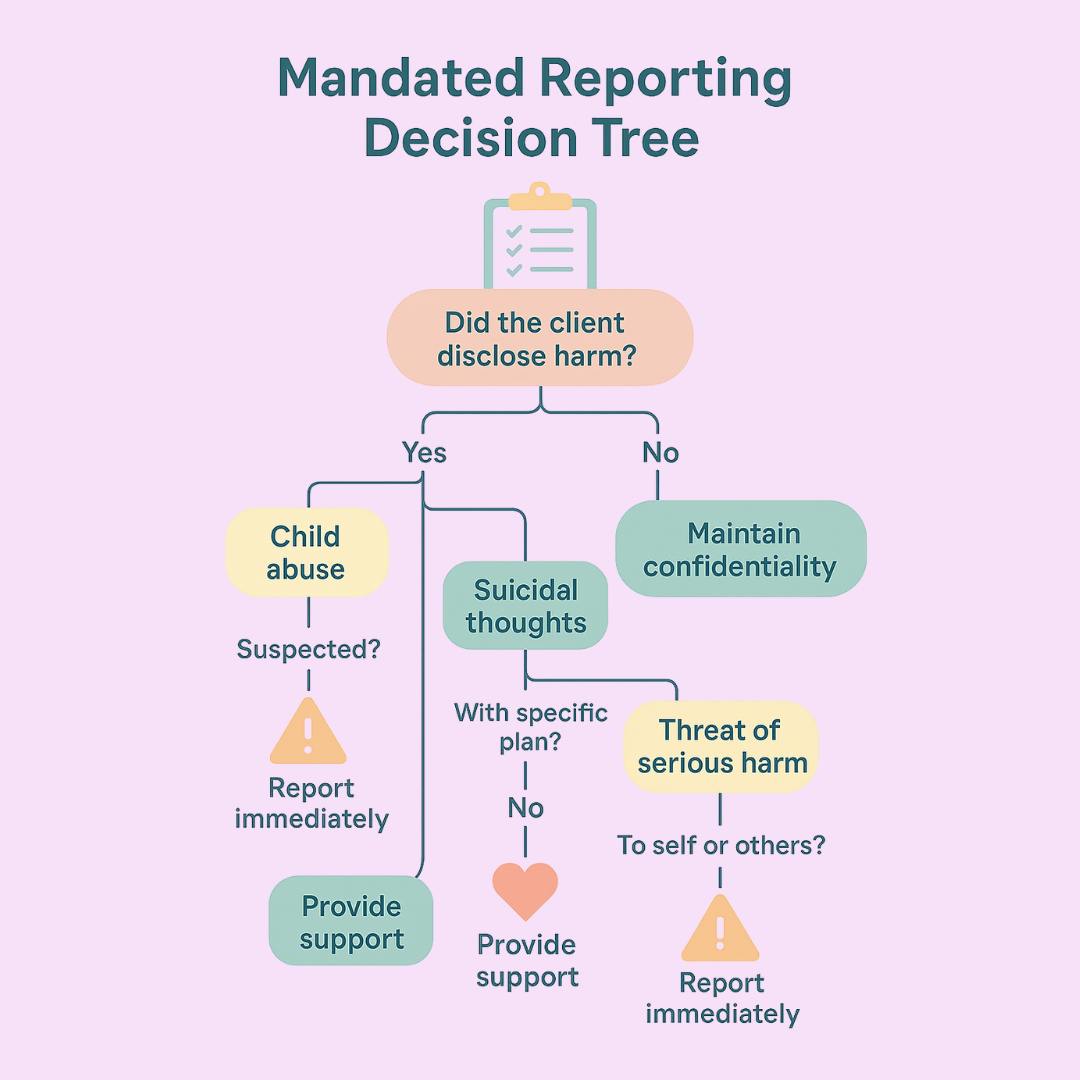You’ve likely had a client pause mid-sentence and ask, “Wait… do you have to report this?”
As a therapist, navigating the line between client confidentiality and legal obligation can be delicate—especially when clients disclose something alarming or ambiguous.
This blog offers a clear, practical breakdown of what do therapists have to report.
We’ll also address what isn’t reportable, and how to talk to clients about confidential information in a way that builds client's trust, not fear. This relates to confidentiality rules.
What Therapists Are Legally Required to Report
While the therapeutic relationship is grounded in strict confidence, it isn’t absolute.
In all 50 U.S. states, certain professionals like therapists are considered mandated reporters under specific conditions. These conditions are defined by confidentiality laws and have important legal consequences if ignored.
Here’s what mental health professionals must report:
1. Imminent Risk of Harm to Self or Others
If a client poses an active threat to:
- Their own life (e.g., suicidal thoughts with a plan and means)
- Another person’s life (e.g., threats to a specific person)
…you are legally obligated to break confidentiality and alert appropriate authorities or the local police department. This relates to immediate danger and a serious threat.
This responsibility stems from the Tarasoff ruling, which created the mandatory duty to warn a potential victim.
2. Child Abuse or Neglect
All therapists must report abuse involving:
- Physical or sexual abuse
- Child pornography
- Neglect or endangerment
Even suspected child abuse must be reported. Contact Child Protective Services or equivalent.
3. Elder Abuse or Abuse of Vulnerable Adults
When vulnerable clients, such as elders or disabled adults, are harmed, therapists must notify Adult Protective Services. Types of abuse may include:
- Financial exploitation
- Physical harm
- Neglect
4. Court-Ordered Disclosures
A court order or legal proceeding may require you to disclose private information. If so, consult a supervisor and verify informed consent if applicable.
You may also be subpoenaed in criminal cases, family law, or guardianship hearings.
You can also have a look at the Mandatory Reporting decision tree in order to make a better choice.

What Therapists Are Not Required to Report
While mandated reporting laws are strict, not every uncomfortable or troubling disclosure automatically crosses the legal threshold.
Many disclosures require empathy, nuance, and clinical discernment, not a phone call to authorities.
Here are some situations that generally do not require reporting:
1. Past crimes
If a client says something like, “I used to steal as a teenager” or “I was involved in some shady stuff years ago,” this doesn’t meet the criteria for mandated reporting- unless the details reveal an ongoing risk (e.g., a pattern of harming others that’s still active).
2. Self-harm ideation without a plan or intent
A client expressing feelings like, “I don’t want to be here anymore” or “Sometimes I think about disappearing,” can be clinically significant, but they aren’t necessarily reportable unless they include a clear plan, intent, and means. This is a moment to assess risk carefully- not to immediately escalate.
3. Substance use or domestic violence not involving vulnerable individuals
A client who discloses substance use, or even being involved in interpersonal violence, doesn’t always trigger reporting unless children, elders, or dependent adults are involved. That said, therapists should still explore safety concerns, especially if others are indirectly affected.
4. Historical abuse shared by an adult
If an adult client discloses past abuse they experienced (such as childhood sexual abuse), you are not legally required to report, unless there is reason to believe that the perpetrator is currently in a position to harm other vulnerable individuals (e.g., still working with children).
Talking to Clients About Confidentiality
Be upfront from the first therapy session. Explain therapist confidentiality and HIPAA privacy rule standards clearly.
Try:
“Our conversations remain confidential unless there’s an immediate risk to you or others, or if we discuss abuse involving a child, elder, or dependent adult. I’ll talk with you before taking any steps.”
Make it a safe space- and set expectations for the few a few exceptions.

Some Gray Areas and Ethical Dilemmas
Examples:
- A teen confides severe self harm but refuses parental involvement
- An adult admits to past crimes involving a family member
- You suspect ongoing suspected abuse or neglect but have minimal detail
This is when you seek consultation, review your ethical principles, and document carefully. When needed, you may still need to disclose confidential information to the appropriate authorities.
What Happens When You File a Report?
Filing doesn’t mean you're accusing. It means:
- Contacting Child Protective Services, police officers, or other entities
- Reporting the suspected abuse or client presents a mental state suggesting immediate danger
- Allowing crisis intervention services to step in
You’re protected when reporting in good faith- even if the claim isn’t substantiated.
Quick Checklist: What You Must Report
Scenario | Mandatory Reporting? |
|---|---|
Client says they feel hopeless | No (monitor, not report) |
Client shares suicidal thoughts + plan | Yes |
Teen discloses sexual abuse | Yes |
Adult client admits past assault | No (unless victim is a minor/at risk) |
Client threatens someone by name | Yes |
Elder is being financially exploited | Yes |
Court subpoenas your notes | Yes |
FAQs: Real Questions Therapists Ask
Q. What if the client begs me not to tell anyone?
A. You must still report if required. Your duty to protect outweighs the desire to remain confidential.
Q. What if I’m unsure about reporting?
A. Use clinical judgment and seek a supervisor or legal consult.
Q. Can I delay reporting?
A. Not if there's an immediate danger. Delay could carry legal consequences.
Q. Do I report past crimes from 10 years ago?
A. Only if they involve current risk, like child abuse or vulnerable clients.
Q. What about online therapy?
A. The same laws apply. Ensure your digital documentation and protected health information remain compliant.
Q. Who are “mandated reporters”?
A. Mental health professionals, teachers, doctors—certain professionals trained to report abuse or danger.
Q. Can Supanote help with this?
A. Yes. Supanote helps you document, and keeps your notes HIPAA-ready for legal proceeding.
Q. What if my client talks about wanting to commit crimes?
A. Evaluate the immediacy. If it poses harm to others, it becomes a serious threat.
Q. What if a client shows signs of suicidal thoughts but denies intent?
A. Monitor closely. Use risk assessments, and revisit in future therapy sessions.
Q. What if I forget to report something I should have?
A. You may be held liable. That’s why using a tool like Supanote helps you catch red flags early.
Q. Do I have to report if the abuse happened in another state?
A. Yes, if the client is currently in your care and the victim is still at risk (e.g., a minor or dependent adult), you must follow your own state’s reporting requirements.
Q. Am I responsible for reporting suspected abuse from decades ago?
A. If the abuse involves a now-adult client and no vulnerable parties are currently at risk, you're generally not legally required to report—but you may still explore safety concerns in therapy.
Q. What if I’m working in a school or agency setting?
A. You are still individually responsible for mandated reporting, even if your workplace has a designated point person. Don’t assume someone else will report for you.
Q. What do I do if my client admits to watching child pornography?
A. This must be reported immediately. Viewing or distributing child pornography is a serious crime that directly harms minors and constitutes mandatory reporting.
Q. Can I consult with a colleague before filing a report?
A. Yes—and it’s encouraged. As long as you maintain strict confidence and the colleague is bound by the same ethical principles, consultation helps clarify your decision.
Q. What if the abuse involves another mental health professional?
A. You’re still obligated to report it if it meets legal thresholds. Licensing boards may also need to be informed depending on the case.
Q. How do I document a decision not to report?
A. Clearly note your rationale, any supervision you sought, and evidence supporting the client’s current safety. Good documentation protects your license.
Q. Can clients see the report I submit?
A. In most states, clients do not have automatic access to reports filed with CPS or APS, but they may request your therapy records if allowed under HIPAA or court rules.
Q. Does mandated reporting apply in group or couples therapy?
A. Yes. If any participant discloses information that triggers a mandated report, you are still obligated to report—even if it disrupts the group dynamic.
Q. What if I'm afraid reporting will harm the therapeutic relationship?
A. While it may create short-term discomfort, clients often appreciate honesty. Framing it as part of your role to protect safety helps maintain trust in the long term.
How Supanote Supports You Through Mandatory Reporting
Supanote helps therapists streamline documentation when handling sensitive disclosures, while keeping you compliant and in control.
As you document, Supanote generates structured therapy notes using formats like SOAP, BIRP, or DAP. You can dictate, upload session audio, or type directly, then review and edit before finalizing. It helps you:
- Efficiently capture disclosures using customizable templates
- Keep an organized, HIPAA-compliant record of notes and consultations
- Save time without sacrificing accuracy or ethical standards
With clear, editable notes and built-in flexibility, Supanote supports your ethical decision-making, without disrupting the therapeutic flow.


